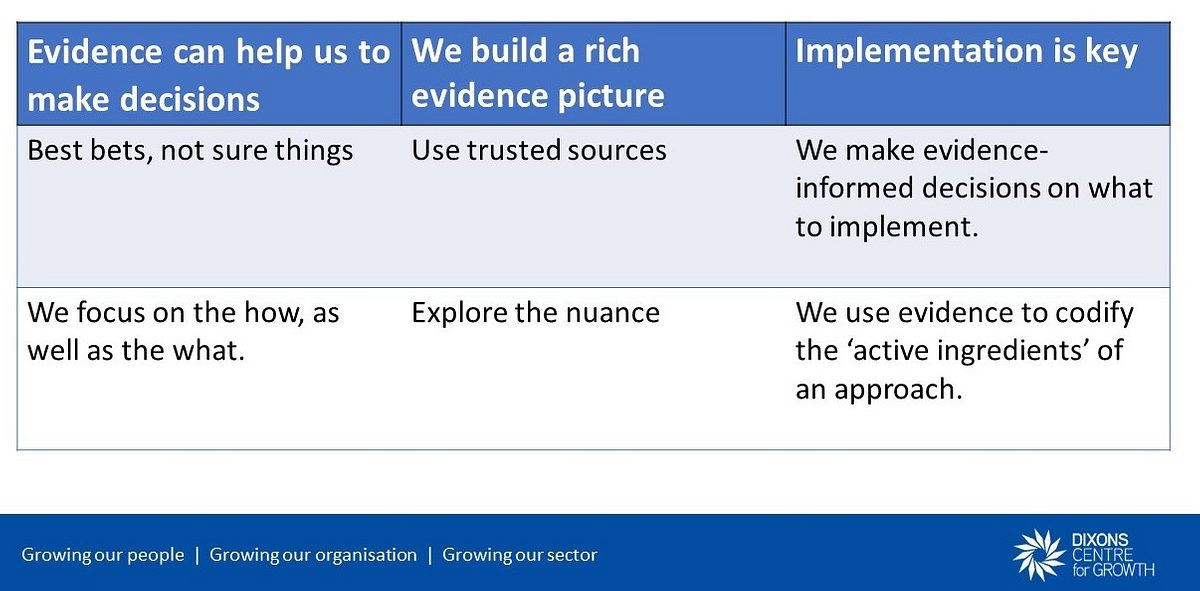
Blog -
Implementation: Engaging People
The EEF’s new implementation guidance report places a focus on engaging people

Share on:

by Bradford Research School
on the
Retrieval practice as a concept has gone fully mainstream, and most schools that we work with have implemented in some way. But to be evidence-informed means exploring the nuance, and in this post we’ll look at some of the things we need to bear in mind for effective implementation.
When we approach anything like this, it’s helpful to have some heuristics that help us to explore evidence and inform our thinking. For example, at Dixons we have defined our evidence ‘metamessages’, which you can read about here.

Retrieval practice is easy to define – the EEF describe it as ‘the process of recalling information from memory with little or minimal prompting.’ It’s what Robert Bjork refers to as a desirable difficulty, because it feels counter intuitive. But the evidence supports the idea that retrieval is more beneficial than simply rereading or restudying information. We see it as one of our best bets – not a surefire guarantee of success but something that is worth doing.
But implementation is key. So, what do we need to know about retrieval practice that will help us to implement it effectively?
The first question is what format should retrieval practice take? At its simplest, Retrieval Practice might mean short question and answers, but studies show that many formats can be beneficial. Matching, short answer, multiple choice, cued recall, free recall and fill-in-the blank exercises. It would seem that keeping the format consistent is more beneficial than inconsistent approaches too. We might see, for example, many lessons beginning with a simple Do Now, which asks pupils to retrieve.
When choosing formats and aiming for consistency, it’s important that we don’t send the signal that Retrieval Practice must only be this one format, or that it should only take place at the start of a lesson. We should provide opportunities throughout lessons and outside of them for retrieval too. There are many formats which include some form of cue and an opportunity for retrieval.
What about the role of feedback? Corrective feedback is likely to be beneficial. In a comprehensive review, Yang et al estimate a positive overall effect for testing with corrective feedback compared to testing without feedback. It makes sense – if pupils recall incorrectly, they may well store that misconception. Feedback need not be onerous on the teacher. It can simply be sharing the answers or asking pupils to check themselves.
Keeping the stakes low is important. With frequent low-stakes quizzing, we can make retrieval routine and actually reduce some test anxiety. We also recommend that teachers discuss with pupils what retrieval practice is and how it works. If pupils understand the benefits and mechanisms for success, this also helps with their motivation. They see the benefits – even when studying independently. There may be times when Retrieval Practice feels harder than re-reading, and therefore increase anxiety and decrease motivation, so pupils who know about this will benefit.
What are the challenges to the evidence? While there is a comprehensive body of evidence that supports the efficacy of the testing effect, we have relatively fewer that exactly replicate the conditions you will encounter in a classroom. In fact, of 21 studies included in the recent EEF Cognitive Science Approaches in the Classroom evidence review, only one was delivered by a classroom teacher. Some in classrooms were delivered by researchers and others took place outside the classroom. And all but two focused on vocabulary or times tables. And there’s huge variation in the impact in each study, despite similar conditions.
Another challenge is in implementation. Professor Rob Coe, in this EEF blog, suggests three ways Retrieval Practice could be implemented poorly:
That being said, can we generalise enough from the evidence to suggest that Retrieval Practice is something we would recommend? Yes. And as long as we continue to stay faithful to the evidence, and any new findings, it is a sensible approach.
As ever, it comes down to implementation. In the video below, we see one example from Steve Kitson, Head of Geography at Dixons Kings Academy:
Next up in this series: Higher order retrieval.
Education Endowment Foundation (2021) Cognitive Science Approaches in the
Classroom: a Review of the Evidence.
Perry, T., Lea, R., Jørgensen, C. R., Cordingley, P., Shapiro, K., & Youdell, D. (2021). Cognitive Science in the Classroom. London: Education Endowment Foundation (EEF).
Both of the above are available here.
Yang, C., Luo, L., Vadillo, M. A., Yu, R., & Shanks, D. R. (2021). Testing (quizzing) boosts classroom learning: A systematic and meta-analytic review.

Blog -
The EEF’s new implementation guidance report places a focus on engaging people

Blog -
We share questions and resources to unpick the EEF’s Voices from the Classroom

Blog -
Investing in Subject Knowledge has Multiple Benefits
This website collects a number of cookies from its users for improving your overall experience of the site.Read more